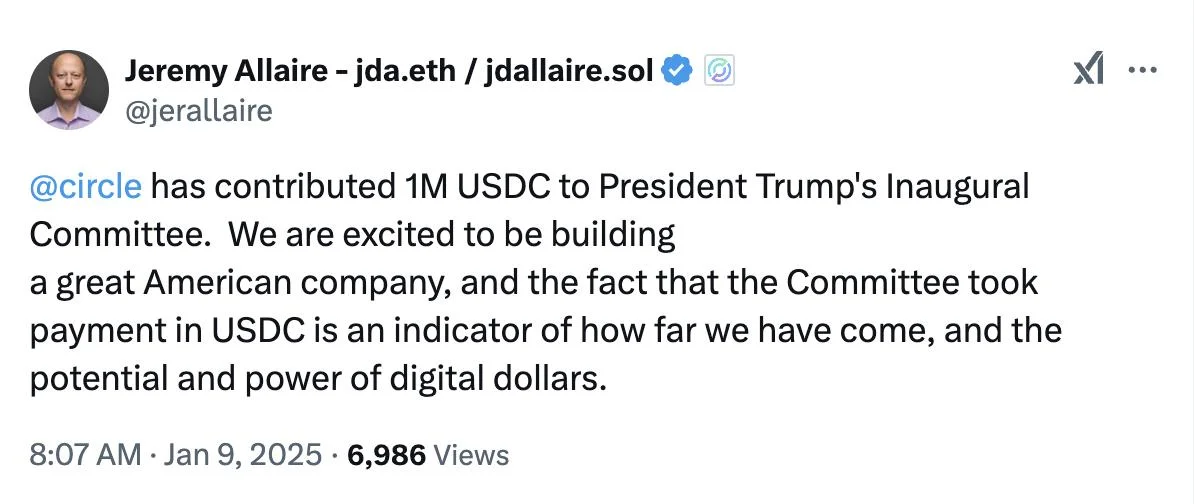Here’s what happened in crypto today

Today in crypto, stablecoin issuer Circle donated $1 million to President-elect Donald Trump’s Inauguration Committee, data from CryptoQuant revealed that Bitcoin reserves held by US-based entities significantly exceed those held offshore, and Oklahoma Senator Dusty Deevers introduced legislation allowing residents in the state to receive salaries and payments in Bitcoin.Circle backs Trump’s inauguration with donationStablecoin issuer Circle donated $1 million worth of USD Coin to Donald Trump’s Inauguration Committee, CEO Jeremely Allaire confirmed on Jan. 9.In a social media post, Allaire lauded the committee’s openness to take payment in USDC, signaling “how far we have come” in promoting the “power of digital dollars.”At $44 billion, Circle’s USDC is the second-largest stablecoin by market capitalization behind only Tether (USDT). Combined, stablecoins are valued at roughly $203 billion. Stablecoins are becoming a core crypto policy issue in the United States, with Senators Kirsten Gillibrand and Cynthia Lummis co-sponsoring the Lummis-Gillibrand Payment Stablecoin Act in 2024.Meanwhile, former US House Speaker Paul Ryan opined in June that stablecoins could help Washington alleviate its debt crisis and protect the dollar’s reserve currency status.US entities hold 65% more Bitcoin than offshore players — CryptoQuantBitcoin (BTC) reserves held by US-based entities significantly exceed those held offshore, according to data from CryptoQuant.US entities’ Bitcoin reserve share reached an all-time high as of Jan. 9, with reserves 65% greater than those held by non-US entities, CryptoQuant data revealed.The ratio of US to offshore Bitcoin holdings climbed from 1.24 in September 2024 to a peak of 1.66 in December and now stands at 1.65. CryptoQuant CEO Ki Young Ju explained that the metric compares the Bitcoin holdings of known US entities — including companies like MicroStrategy, spot Bitcoin exchange-traded funds (ETFs), exchanges, miners and the US government — to those of known offshore entities.Oklahoma senator introduces Bitcoin Freedom Act for BTC paymentsRepublican senator for Oklahoma, Dusty Deevers, has introduced legislation that would allow employees and residents in the state to opt to receive payment and salaries in Bitcoin and enable vendors to accept BTC payments.“In a time when inflation is eroding the purchasing power of hard-working Oklahomans, Bitcoin provides a unique opportunity to protect earnings and investments,” said Deevers after introducing the Bitcoin Freedom Act on Jan. 8.“As Bitcoin continues to rise and the value of the dollar continues to be printed away in Washington D.C., Oklahoma must act to protect our people,” he added. The bill, called SB325, ensures that participation is entirely voluntary, “respecting free-market principles” and empowering employees, employers, and businesses to choose their own payment options, he stated. According to the filing, one of the purposes of the act is to “establish a framework for the secure use of Bitcoin by the State of Oklahoma, private businesses, and individual residents,” and another is to “authorize Bitcoin as an acceptable medium for transactions, salaries, and investments.”The legislation puts Oklahoma in a “leadership role nationally” while ensuring the state “embraces the future of financial technology while providing our citizens with more financial options,” he said.